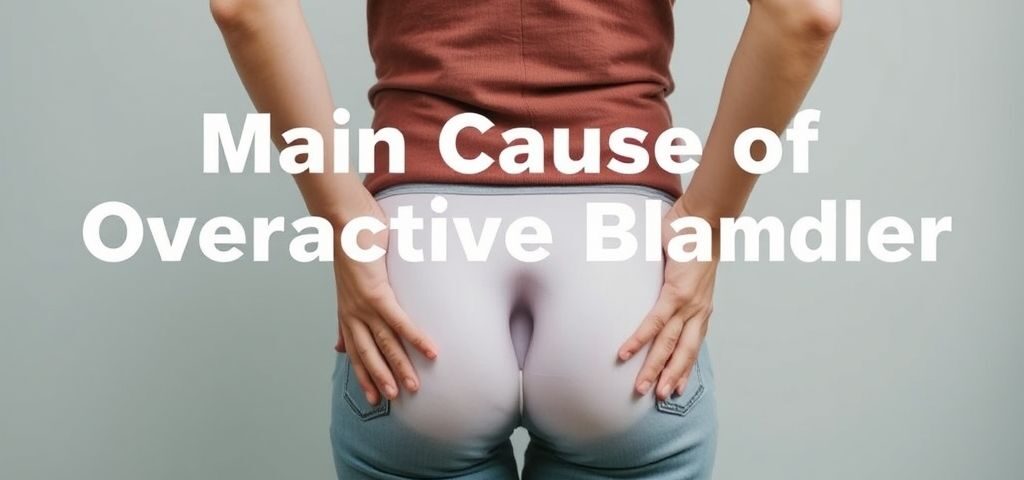Ever feel the urgent need to rush to the bathroom — even when you just went a few minutes ago? You might be dealing with an overactive bladder (OAB). It’s more common than you think, and if you’re wondering what the main cause is, you’re in the right place. Main Cause of Overactive Bladder
Overactive bladder isn’t just about inconvenience; it can seriously affect your quality of life, confidence, and sleep. Let’s break it down — what’s really behind this bladder issue, and how can you take control?
What Is Overactive Bladder (OAB)?
Overactive bladder is a condition marked by:
A sudden, intense urge to urinate
Frequent urination (often more than 8 times a day)
Waking up multiple times at night to pee (nocturia)
Sometimes, involuntary leakage (urge incontinence)
It’s not a disease itself but a collection of symptoms caused by various underlying factors, and understanding those is key to finding relief.
The Main Cause of Overactive Bladder
The primary cause of overactive bladder is the involuntary contraction of the detrusor muscle, which is the muscle in your bladder wall. This muscle starts squeezing even when the bladder isn’t full, making you feel like you need to urinate urgently.
This involuntary muscle activity is typically triggered by:
Nerve signals are being sent at the wrong time
Miscommunication between the bladder and the brain
Bladder irritation or sensitivity
These abnormal contractions can happen even with a small amount of urine in the bladder.
Top Underlying Factors Behind OAB
Let’s explore the most common contributors to an overactive bladder:
1. Neurological Disorders
Conditions like:
Parkinson’s disease
Stroke
Spinal cord injury
These can disrupt the nerve signals between your bladder and brain, causing the bladder to contract uncontrollably.
2. Age-Related Changes
As we age, bladder capacity and muscle tone naturally decline. Aging also affects the brain-bladder connection, making OAB more likely, especially in people over 60.
3. Diabetes
High blood sugar can damage nerves over time, including those that control the bladder. Diabetic neuropathy is a leading contributor to OAB in diabetics.
4. Urinary Tract Infections (UTIs)
A bladder infection can cause irritation, which mimics the symptoms of OAB, such as urgency, frequency, and pain.
5. Bladder Abnormalities
Bladder stones
Tumors (benign or cancerous)
Inflammation
These conditions can directly irritate the bladder wall, leading to overactivity.
6. Enlarged Prostate (in men)
An enlarged prostate can block the flow of urine and cause the bladder to work harder, eventually resulting in detrusor overactivity.
7. Hormonal Changes (in women)
Postmenopausal women often experience thinning of the bladder lining and weakening of pelvic floor muscles due to lower estrogen levels, increasing the risk of OAB.
8. Obesity
Excess weight puts pressure on the bladder and pelvic floor muscles, leading to poor bladder control and frequent urges.
9. Chronic Constipation
A full rectum can press against the bladder and irritate the nerves controlling urination.
Lifestyle and External Triggers
Sometimes, OAB symptoms are worsened or triggered by daily habits:
1. Caffeine and Alcohol
These act as diuretics and bladder irritants, increasing urine production and urgency.
2. Artificial Sweeteners
Found in diet drinks and sugar-free gum, they can irritate the bladder lining and increase urgency.
3. Medications
Diuretics (used for high blood pressure or heart conditions) can lead to frequent urination. Other meds may overstimulate the bladder as a side effect.
4. Inadequate Hydration
Oddly enough, drinking too little water can make urine more concentrated and irritating to the bladder, worsening OAB symptoms.

Psychological and Emotional Triggers
Yes, your mental state can affect your bladder.
Chronic stress and anxiety stimulate the nervous system and may increase bladder sensitivity.
Sleep disorders disrupt hormonal balance and the bladder’s circadian rhythm, leading to more nighttime urination.
When the Cause is Unknown (Idiopathic OAB)
In many people, no specific cause can be identified. This is called idiopathic overactive bladder. It still involves bladder muscle overactivity, but the root trigger remains unclear. Lifestyle adjustments and treatments still work effectively in most of these cases.
How Is Overactive Bladder Diagnosed?
If you suspect OAB, your doctor may perform:
Urine tests (to rule out infection or blood in the urine)
Bladder diary (track how often you urinate and when)
Post-void residual test (see how much urine remains after urination)
Neurological exam (if nerve issues are suspected)
Cystoscopy or ultrasound, if abnormalities are suspected
What Can You Do About It?
While some causes (like neurological damage) may not be reversible, many cases of OAB improve dramatically with treatment:
1. Bladder Training
Gradually increasing the time between bathroom visits can help retrain the bladder.
2. Pelvic Floor Exercises (Kegels)
Strengthening the muscles that control urination can prevent leakage and reduce urgency.
3. Dietary Adjustments
Cut back on caffeine, alcohol, and spicy or acidic foods. Drink water throughout the day but reduce intake before bedtime.
4. Medications
Anticholinergics or beta-3 adrenergic agonists can relax the bladder and reduce symptoms.
5. Neuromodulation Therapies
Devices like PTNS (peripheral tibial nerve stimulation) or sacral nerve stimulation can help regulate bladder signals.
6. Surgery (for severe cases)
If all else fails, options like bladder augmentation or Botox injections may be recommended.

Conclusion
So, what’s the main cause of an overactive bladder?
It all boils down to involuntary bladder muscle contractions, most often due to nerve miscommunication, irritation, or underlying conditions like aging, neurological disorders, or lifestyle habits. The good news? OAB is manageable and even reversible in many cases with the right diagnosis and treatment.
If you’ve been tiptoeing around the bathroom or mapping your day based on toilet access, it’s time to take action. Talk to your doctor, explore treatment options, and take control of your bladder — and your life.
FAQs
What is the most common cause of an overactive bladder?
The most common cause is the involuntary contraction of the bladder muscles, often due to neurological signals being sent at the wrong time.
Can stress cause an overactive bladder?
Yes. Stress activates your nervous system, which can overstimulate the bladder and worsen OAB symptoms.
Is an overactive bladder permanent?
Not always. Many people experience improvement or complete resolution with treatment and lifestyle changes.
At what age does an overactive bladder start?
While OAB can affect anyone, it’s most common in people over 40 or 50 years old.
Can drinking too much water cause an overactive bladder?
Drinking excessive amounts of water can increase frequency, but underhydration can irritate the bladder, too. Balance is key.

